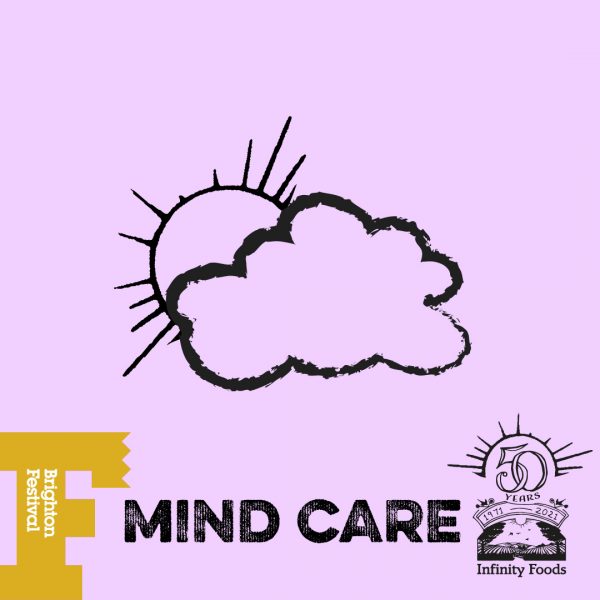This year we are supporting Brighton Festival, and in 2021 the theme is care.
The theme of the festival is care, and by that, I really mean looking after ourselves and thinking about others. Those two things are so important. Someone said to me the important thing is to ‘take it easy but take it all, and I think this whole thing has reminded me how important it is to care for yourself as well as other people. When the pandemic happened, I was faced most of all with my own thoughts, my own moods, my own attitudes to the rest of the world and friends and to who I am.
– Lemn Sissay (Guest Director)
With this quote in mind, we welcome you to a series on care:
It’s important to take care of yourself and get the most from life, all too often we focus more on physical health, but our mental health needs just as much attention. Below are our top tips to care for your mind. Making simple changes to how you live doesn’t need to cost a fortune or take up loads of time.
THESE ARE OUR ‘TOP TIPS’ FOR MIND CARE
1.Talk about your feelings
Talking can be a way to cope with a problem you’ve been carrying around in your head for a while. Just being listened to can help you feel supported and less alone. And it works both ways. If you open up, it might encourage others to do the same, helping you to feel more included and have stronger bonds with your peers.
It’s not always easy to describe how you’re feeling. If you can’t think of one word, use lots. What does it feel like inside your head? What does it make you feel like doing? If it feels awkward at first, give it time. Make talking about your feelings something that you do – try starting with journaling, this can be a great way to open up to yourself.
2.Keep moving
Exercising doesn’t just mean doing sport or going to the gym. Walks in the park, gardening, yoga or housework can also keep you active.
Experts say most people should do about 30 minutes’ exercise at least five days a week. Try to make a physical activity that you enjoy a part of your day. When you feel good in your body and start to see positive changes, it can really boost your confidence, especially when you’re having fun with it. If you are struggling to get started try joining a class at the Brighton Natural Health Centre (BNHC)
3.You are what you eat
Food can also have a long-lasting effect on your mental health. Your brain needs a mix of nutrients to stay healthy and function well, just like the other organs in your body.
A diet that’s good for your physical health is also good for your mental health.
A healthy balanced diet includes:
- lots of different types of fruit and vegetables
- wholegrain cereals or bread
- nuts and seeds
- plenty of water.
Eat at least three meals each day and drink plenty of water. Try to limit how many high-caffeine or sugary drinks you have, and avoid too much alcohol.
Visit our shop, we have the largest array of certified organic fruits and vegetables in Brighton and Hove, organic food has been shown to contain higher amounts of vital vitamins, minerals and macro-nutrients. This is because the soil is much healthier in organic farming than in conventional chemical farming.
If you still feel like you might be deficient in something, contact your doctor for advice, and try beneficial herbs for stress like adaptogens: Ashwagandha, Rhodiola and Lemon Balm or nootropics: Bahrami, Reishi and Ginkgo Biloba.
4.Breath in… Let it go
You may not be aware of your breathe all of the time, but through practice, you can gain a greater awareness of your breath and learn how to manipulate it to your advantage. When we are stressed we tend to breathe faster and shallower, which can, in turn, create more stress and inflammation in the body and mind.
There are thousands of studies that have shown meditation & breathing techniques can positively impact mental and physical health. Whether it’s by reducing stress, improving sleep, increasing focus, or improving relationships, research shows intentional breathing works. If you are new to meditation try a BNHC meditation course, or as many people have in the UK in recent years try the Wim Hof Method.
5.You Do You
We’re all different. It’s much healthier to accept that you’re unique than to wish you were more like someone else. Feeling good about yourself boosts your confidence to learn new skills, visit new places and make new friends. Good self-esteem helps you cope when life takes a difficult turn.
Be proud of who you are and how far you’ve come to get where you are right now. Recognise and accept what you are not good at, but focus on what you can do well.
Work out if there’s anything about yourself that you still want to change. Are your expectations realistic? If they are, work towards your goals and take small steps to get on track.
Remember, you do you better than anyone else, just own it.
6.Warm your heart with the cold
Cold shower therapy is an ancient Ayurvedic remedy that has numerous health benefits such as treating anxiety and depression, improving circulation and toning skin. The use of coldness as a ‘good stressor’ on the body can help to trigger several helpful responses within the human body.
In recent years, cold body therapy has gained serious popularity. You can practice cold therapy from within the comforts of your home, by taking a cold shower or getting one with nature, try swimming in the Brighton & Hove sea. Why not get in, it’s a resource you don’t even know you’re missing out on.
Frequent exposure to cold is linked to a number of different health benefits. For example, scientists have found evidence that exposure to cold speeds up metabolism. Another benefit of exposing your body to cold is that it reduces mental stress and physical stress like inflammation, swelling and sore muscles. Furthermore, cold body therapy is also linked to improved quality of sleep, more focus, and even an improved immune response.
7.Giving Back
Why not share your skills more widely by volunteering for a local charity? Helping out can make us feel needed and valued and that boosts our self-esteem. Friends are really important too, friends help each other whenever they can, so it’s a two-way street and supporting each other is uplifting.
Helping others changes the way we see the world, by putting our own problems into perspective.
Get in contact with your local mutual aid group and see if anyone would benefit from your time and or skills.
Caring for an animal companion can improve your wellbeing too.
The bond between you and your animal friend can be as strong as between people. Looking after an animal companion can bring structure to your day and act as a link to other people. Lots of people make friends by chatting to fellow dog walkers.
These tips are all very helpful for day to day life but if you are really struggling, please get in touch with an expert like your doctor, therapist or contact Grassroots, a leading group on suicide prevention.
FEEDING YOU TROUGH THE DECADES




